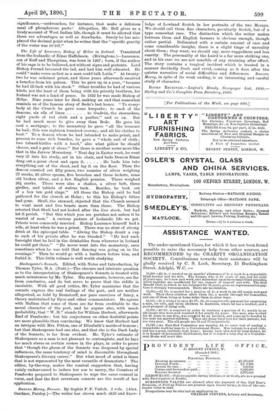The Life of Laurence, Bishop of Haar in Iceland. Translated
from the Icelandic of Einar Haffidason. (Rivingtons.)—Laurence, son of Kalf and Thorgrima, was born in 1267; born, if the author of his saga is to be believed, not without signs and portents. Lord Bishop Jorimd favoured the lad, and had him well educated. He could "make verse as fast as a man could talk Latin." At twenty- two he was ordained priest, and three years afterwards received a benefice from his patron. This he gave up in a year, "because he had ill-luck with his stock." Other troubles he had of various kinds, not the least of them being with his priestly brethren, for Iceland was not a land of peace. In 1322 he was made Bishop of Holar. Nine years later he died, making an end that somewhat reminds us of the famous story of Bede's last hours. "To every- body at the Church he gave some keepsake ; to each of the deacons, six ells of linen to Gudnin, the stewardess, eight yards of red cloth and a psalter," and so on. But he had much more to give away than Bede. He gave his cook a mortgage; to the monastery he gave "all the treasure he had ; this was eighteen hundred crowns ; and all his clothes to boot." To a deacon whom he had intended to make priest, and present to some rich benefice, he gave a "whole suit of cloth ; two tabard-kirtles with a hood," also what pillow he should choose, and a pair of shoes." But there is another scene more like that in the Jarrow Monastery. "Next day in Easter week, he went very ill into his study, sat in his chair, and bade Deacon Einar drag out a great chest and open it He bade him take everything out of the chest, and lay it on the floor. Then the deacon counted out fifty pence, two rosaries of silver weighing 37 marks, 23 silver spoons, five brooches and three lockets, some old broken silver, and a few English pennies. These weighed 264 marks. There were also a chalice, a silver belt, three girdles, and tablets of walrus tusk. Besides, he took out of a box ten gold rings." All these the Bishop said he had gathered for the church at Holar ; to this his Bishop's tithes had gone. Skuli, the steward, objected that the Church seemed to want meat and live beasts more than these. The Bishop retorted that Skull had not looked after the live stock, but had let it perish. "But this which you see perishes not unless it be wasted of men." I curious picture of Icelandic life we get. Priests were commonly married. Bishop Laurence himself had a wife, at least when he was a priest. There was no stint of strong drink at the episcopal table. "Alwing the Bishop drank a cup to each of his priests after he was blooded." "He had such foresight that he laid in the drinka,ble,s from wherever in Iceland he could get them." "He never went into the monastery, save sometimes when he was told that dancing was going on in the evenings." Then he would go with a lanthorn before him, and forbid it. This little volume is well worth studying.


































 Previous page
Previous page